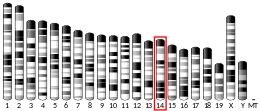Coiled-Coil Domain Containing Protein – 25
The Coiled-Coil Domain Containing Protein – 25 (CCDC25) is a human protein whose function is not presently understood.
| CCDC25 | |||||||||||||||||||||||||
|---|---|---|---|---|---|---|---|---|---|---|---|---|---|---|---|---|---|---|---|---|---|---|---|---|---|
| Identifiers | |||||||||||||||||||||||||
| Aliases | CCDC25, Coiled-Coil Domain Containing Protein – 25, coiled-coil domain containing 25 | ||||||||||||||||||||||||
| External IDs | MGI: 1914429 HomoloGene: 6645 GeneCards: CCDC25 | ||||||||||||||||||||||||
| |||||||||||||||||||||||||
| |||||||||||||||||||||||||
| Orthologs | |||||||||||||||||||||||||
| Species | Human | Mouse | |||||||||||||||||||||||
| Entrez | |||||||||||||||||||||||||
| Ensembl | |||||||||||||||||||||||||
| UniProt | |||||||||||||||||||||||||
| RefSeq (mRNA) | |||||||||||||||||||||||||
| RefSeq (protein) | |||||||||||||||||||||||||
| Location (UCSC) | Chr 8: 27.73 – 27.77 Mb | Chr 14: 65.84 – 65.87 Mb | |||||||||||||||||||||||
| PubMed search | [3] | [4] | |||||||||||||||||||||||
| Wikidata | |||||||||||||||||||||||||
| |||||||||||||||||||||||||
Gene
The gene encoding the CCDC25 protein is located at 8p21.1, on the short arm of human chromosome 8,[5] and is transcribed into an mRNA product approximately 3,583 nucleotides in length.
Protein
General
The protein is highly conserved among mammals as well as eukaryotes as diverse as Arabidopsis thaliana. CCDC25 is made up of a single polypeptide chain 208 amino acids in length and is expressed at a high level, nearly 4.2 times that of a normal human protein.[6] Its expression is nearly ubiquitous in human tissues with little indication that its expression level changes drastically in diseased tissues.[7] Despite currently lacking a well understood function, CCDC25 is predicted to localize to the nucleus[6] and was shown by a microarray experiment to be upregulated in Metaphase II oocytes.[8]
Interactions
CCDC25 was shown by a yeast-two-hybrid assay to interact with Smad2, a latent transcription factor that is part of the TGF-β signaling pathway.[9] The protein is a predicted substrate of Casein Kinase 1, Casein Kinase 2, cGMP-dependent protein kinase, and the Insulin Receptor; all of which have well defined roles in cell signaling.
References
- GRCh38: Ensembl release 89: ENSG00000147419 - Ensembl, May 2017
- GRCm38: Ensembl release 89: ENSMUSG00000022035 - Ensembl, May 2017
- "Human PubMed Reference:". National Center for Biotechnology Information, U.S. National Library of Medicine.
- "Mouse PubMed Reference:". National Center for Biotechnology Information, U.S. National Library of Medicine.
- "Gene - CCDC25".
- "AceView - CCDC25".
- "EST Profile - CCDC25".
- "GEO Profiles - GDS3256 CCDC25".
- "MINT - CCDC25".
Further reading
- Olsen JV, Blagoev B, Gnad F, et al. (2006). "Global, in vivo, and site-specific phosphorylation dynamics in signaling networks". Cell. 127 (3): 635–48. doi:10.1016/j.cell.2006.09.026. PMID 17081983.
- Rose JE, Behm FM, Drgon T, et al. (2010). "Personalized smoking cessation: interactions between nicotine dose, dependence and quit-success genotype score". Mol. Med. 16 (7–8): 247–53. doi:10.2119/molmed.2009.00159. PMC 2896464. PMID 20379614.
- Gerhard DS, Wagner L, Feingold EA, et al. (2004). "The status, quality, and expansion of the NIH full-length cDNA project: the Mammalian Gene Collection (MGC)". Genome Res. 14 (10B): 2121–7. doi:10.1101/gr.2596504. PMC 528928. PMID 15489334.
- Ota T, Suzuki Y, Nishikawa T, et al. (2004). "Complete sequencing and characterization of 21,243 full-length human cDNAs". Nat. Genet. 36 (1): 40–5. doi:10.1038/ng1285. PMID 14702039.
- Ballif BA, Villén J, Beausoleil SA, et al. (2004). "Phosphoproteomic analysis of the developing mouse brain". Mol. Cell. Proteomics. 3 (11): 1093–101. doi:10.1074/mcp.M400085-MCP200. PMID 15345747.
- Kimura K, Wakamatsu A, Suzuki Y, et al. (2006). "Diversification of transcriptional modulation: large-scale identification and characterization of putative alternative promoters of human genes". Genome Res. 16 (1): 55–65. doi:10.1101/gr.4039406. PMC 1356129. PMID 16344560.
- Strausberg RL, Feingold EA, Grouse LH, et al. (2002). "Generation and initial analysis of more than 15,000 full-length human and mouse cDNA sequences". Proc. Natl. Acad. Sci. U.S.A. 99 (26): 16899–903. doi:10.1073/pnas.242603899. PMC 139241. PMID 12477932.



